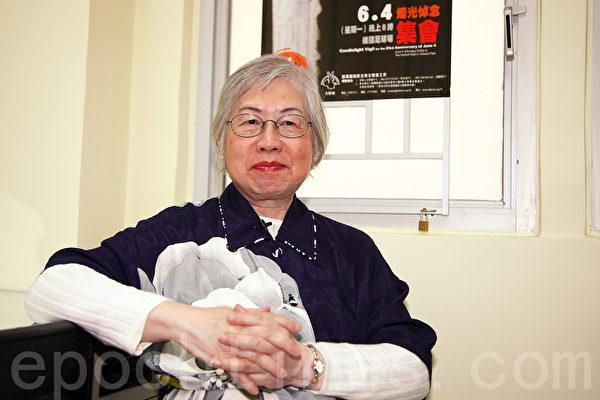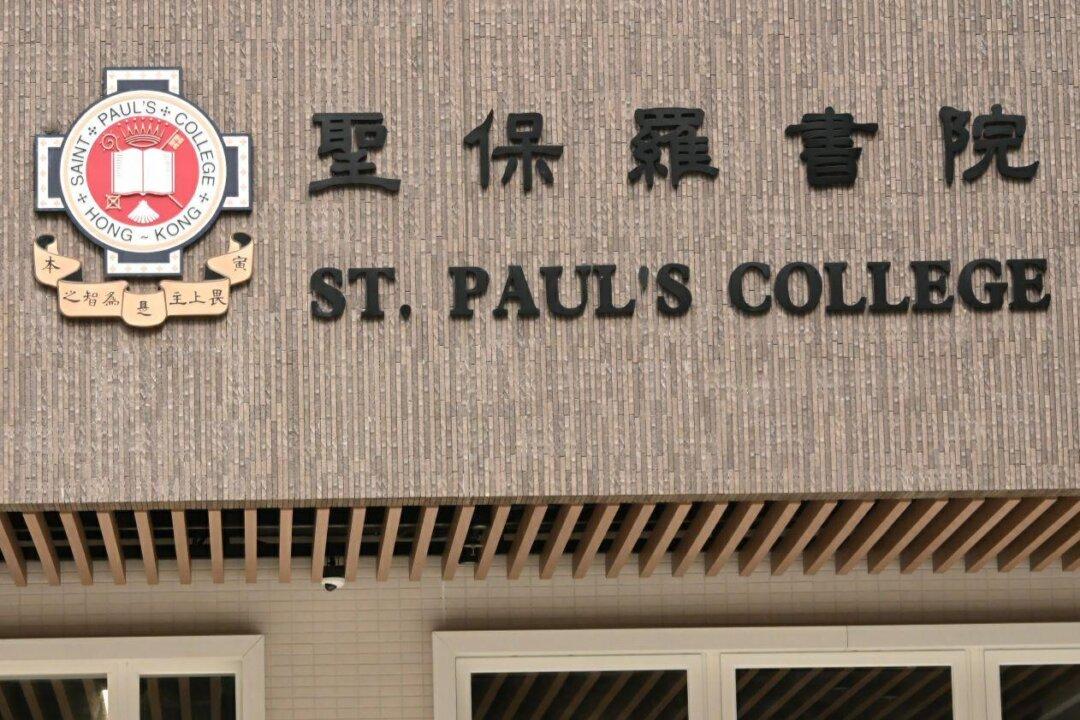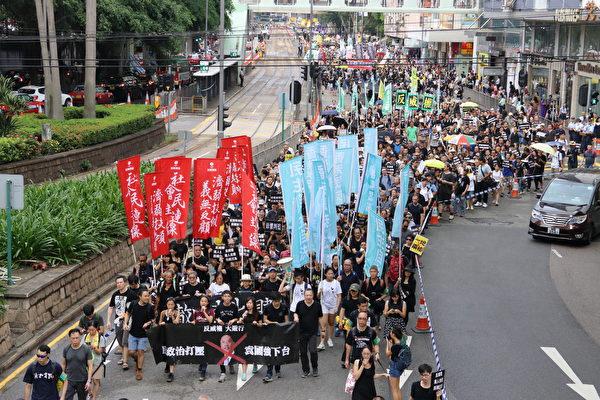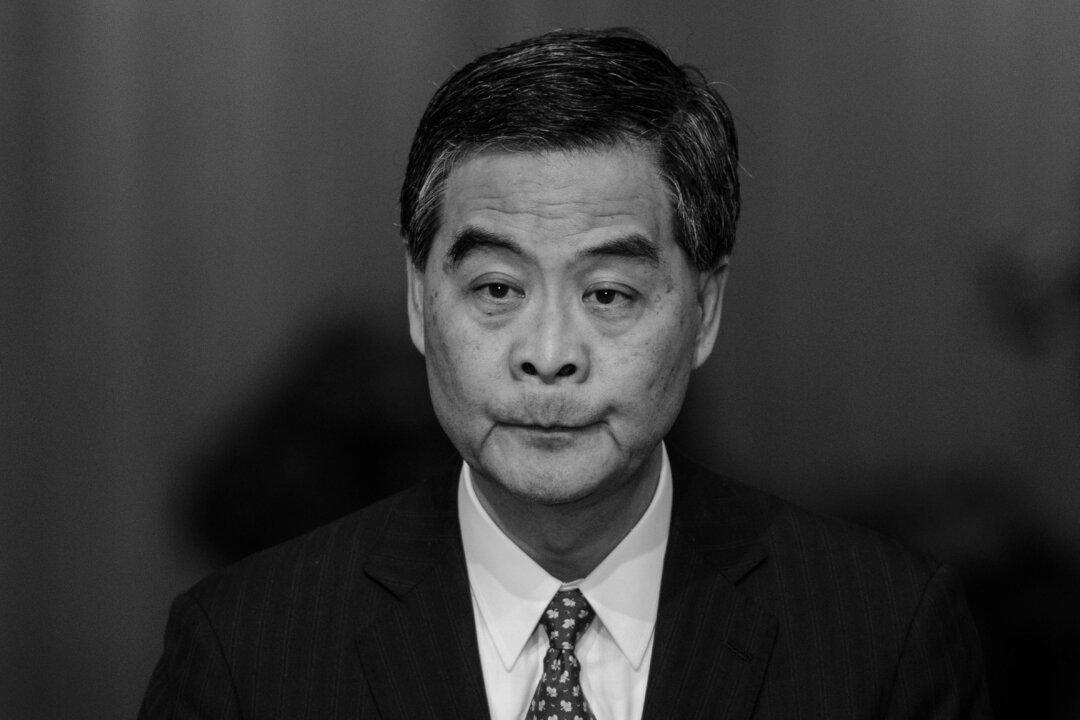Following the recent Hong Kong election protests, Chinese writer Liang Muxian, who traveled from her home in Canada to Hong Kong for the release of her new book, talked with The Epoch Times about her decision to break away from the Chinese Communist Party (CCP).
Thousands of Hong Kong citizens recently took to the streets to protest the March 25 “small circle” election of Leung Chun-ying as their new chief executive. Leung is believed to be a member of the CCP, and protesters said they do not want to be ruled by a CCP member, and that Beijing should stop interfering with Hong Kong’s elections.
Liang Muxian’s book, published just six days before the election, may have ignited the protests. A former CCP member herself, Liang (aka Florence Leung Mo-han) claimed in her new book, My Time in Hong Kong’s Underground Communist Party, that newly elected Leung Chun-ying is an underground communist, and that covert CCP members have infiltrated high levels of Hong Kong’s government.
Liang Muxian, a woman in her 70s, spoke with The Epoch Times about experiences that eroded her belief in the CCP and her regret at having been a member of the CCP.
Mysterious Plane Crash
Liang said she was just an “obedient girl” when she first joined the Communist Youth League in Hong Kong in 1956, and she deeply believed in the CCP until the Lin Biao incident.
Lin Biao, a major Chinese communist military leader who was once chairman Mao’s right-hand man, died in a suspicious 1971 plane crash as he attempted to flee from China following what appeared to be a failed coup to oust Mao. After his death, Lin was condemned as a traitor and a counter-revolutionary.
This really cast doubt on her belief in the Party, Liang said.
Click this tag or www.ept.ms/ccp-crisis to read about the most recent developments in the ongoing power struggle within the Chinese communist regime. Intra-CCP politics are a challenge to make sense of, even for veteran China watchers. Here we attempt to provide readers with the necessary context to understand the situation. Get the RSS feed. Get the Timeline of Events. Who are the Major Players?![]()
“We were holding Mao’s little red book, wishing Lin good health. Suddenly his plane mysteriously crashed, and he died a fiery death. This was really shocking. I started to have doubts. What was the Party doing? How could this happen? Lin was already Mao’s successor, confirmed by the Ninth National Congress, so what was going on?” Liang said.
The Party circulated many documents attempting to calm people down, Liang said, but there was already doubt in her mind. “I needed to think it through. Because I couldn’t help questioning how overnight Lin went from hero to villain, I wasn’t able to put my mind on the CCP underground work that I was in charge of at the time, as the chairperson of the Hok Yau Club.”
According to Wikipedia, the Hok Yau Club is a non-profit, non-governmental organization in Hong Kong, established in 1949, the year when the CCP seized power in China. It proclaims to provide student support services and youth activities, but according to Liang, who was president of the club between 1962 and 1974, the organization has always operated under instructions from the CCP.
Treason
Later, a more personal affair made Liang question her belief in the CCP even more. When her mother-in-law, who was living in Canada, became very sick, Liang and her husband wanted to go to Canada to visit her, but were obstructed and reprimanded by CCP officials.
“We were told: ‘You want to go abroad? Having illicit relations with a foreign country is a felony, and you want to go abroad?’” Liang recalled.
“They thought that if you leave China, you would never come back,” she said. “And they considered leaving [China] to be treason. The CCP leadership organization criticized my husband directly, putting a lot of pressure on us.”
Liang said she was very conflicted about what to do and about her allegiance to the Party, and felt that it was unfair for them to put such pressure on her husband. Finally, they decided to emigrate.
Tiananmen Square
The third incident, the one which totally awakened Liang to the CCP’s true nature, was the June 4, 1989 Tiananmen Square Student Massacre. She said it hit her hard.
“When a country uses military force to slaughter its own people, the regime shouldn’t exist anymore. I sat in front of the TV as the tragedy was broadcast overseas, crying with anger and sadness.”
Liang said she returned to Hong Kong at the end of that year to find out what she could do to help with the democracy movement, but found that there was nothing she could do. Many friends were asking her for advice on how they could emigrate from Hong Kong. Upon witnessing the Tiananmen Massacre, they too had lost their hope in the CCP and wanted to leave Hong Kong, because Hong Kong was to be handed back to China in 1997, and these people did not want to live under CCP rule.
Biggest Regret
The biggest mistake of her life was to believe in the CCP, Liang said. “It turns out this one-party CCP regime is very corrupt, and endlessly engages in power struggles and fights.”
Liang said she very much regrets joining the Party. But she has even worse regrets about having persuaded young students to also become CCP members.
Click this tag or www.ept.ms/ccp-crisis to read about the most recent developments in the ongoing power struggle within the Chinese communist regime. Intra-CCP politics are a challenge to make sense of, even for veteran China watchers. Here we attempt to provide readers with the necessary context to understand the situation. Get the RSS feed. Get the Timeline of Events. Who are the Major Players?![]()
“I ruined them,” she said. “I think this is the biggest mistake of my life. Some of them have been brainwashed by the CCP and follow the CCP. Their futures are ruined. I regret this the most.”
Yet, she also feels fortunate that she woke up in time, Liang said, and she has tried to redeem herself by writing articles to expose the regime’s crimes and covert activities. Writing has become a process of redemption, she said.
“My crime is that I worshiped Mao and worked for the CCP, for such a corrupted party. Writing the book was a process of redeeming myself. It has been cathartic. I can let go and improve myself. So I feel very happy while I’m writing. It has cleansed my once polluted heart.”
The most evil thing the CCP does is to mislead and fool people by blocking them from obtaining information and being able to know the truth about events, Liang said. “It’s actually a policy of brainwashing,” she said. “Now the situation is a little better than before because of the Internet. Before [there was] the Internet, people didn’t even know how many had been starved to death by the regime during the great famine in the 50s.”
Liang said she knew about the “tuidang” or Quitting-the-CCP movement and has also read the “Nine Commentaries on the Chinese Communist Party,” an editorial series by The Epoch Times that has inspired over 113,000,000 million Chinese to declare their renouncement from the CCP and its affiliated youth groups. Liang said the movement is very significant and has accomplished a lot.
Read the original Chinese article.




